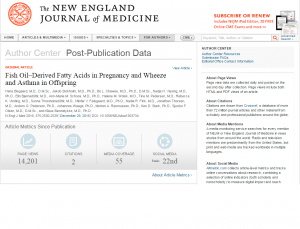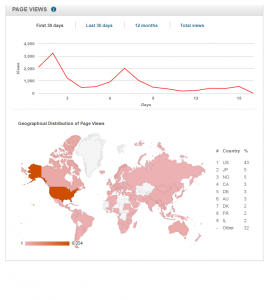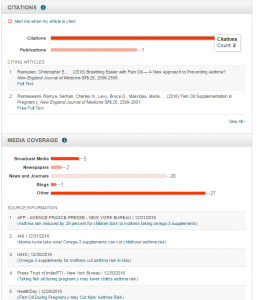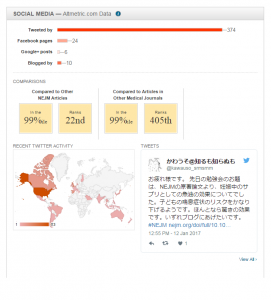N Engl J Med. 2016 Dec 29.
Bisgaard H, Stokholm J, Chawes BL, Vissing NH, Bjarnadóttir E, Schoos AM, Wolsk HM, Pedersen TM, Vinding RK, Thorsteinsdóttir S, Følsgaard NV, Fink NR, Thorsen J, Pedersen AG, Waage J, Rasmussen MA, Stark KD, Olsen SF, Bønnelykke K.
Abstract
Background Reduced intake of n-3 long-chain polyunsaturated fatty acids (LCPUFAs) may be a contributing factor to the increasing prevalence of wheezing disorders. We assessed the effect of supplementation with n-3 LCPUFAs in pregnant women on the risk of persistent wheeze and asthma in their offspring. Methods We randomly assigned 736 pregnant women at 24 weeks of gestation to receive 2.4 g of n-3 LCPUFA (fish oil) or placebo (olive oil) per day. Their children formed the Copenhagen Prospective Studies on Asthma in Childhood2010 (COPSAC2010) cohort and were followed prospectively with extensive clinical phenotyping. Neither the investigators nor the participants were aware of group assignments during follow-up for the first 3 years of the children’s lives, after which there was a 2-year follow-up period during which only the investigators were unaware of group assignments. The primary end point was persistent wheeze or asthma, and the secondary end points included lower respiratory tract infections, asthma exacerbations, eczema, and allergic sensitization. Results A total of 695 children were included in the trial, and 95.5% completed the 3-year, double-blind follow-up period. The risk of persistent wheeze or asthma in the treatment group was 16.9%, versus 23.7% in the control group (hazard ratio, 0.69; 95% confidence interval [CI], 0.49 to 0.97; P=0.035), corresponding to a relative reduction of 30.7%. Prespecified subgroup analyses suggested that the effect was strongest in the children of women whose blood levels of eicosapentaenoic acid and docosahexaenoic acid were in the lowest third of the trial population at randomization: 17.5% versus 34.1% (hazard ratio, 0.46; 95% CI, 0.25 to 0.83; P=0.011). Analyses of secondary end points showed that supplementation with n-3 LCPUFA was associated with a reduced risk of infections of the lower respiratory tract (31.7% vs. 39.1%; hazard ratio, 0.75; 95% CI, 0.58 to 0.98; P=0.033), but there was no statistically significant association between supplementation and asthma exacerbations, eczema, or allergic sensitization. Conclusions Supplementation with n-3 LCPUFA in the third trimester of pregnancy reduced the absolute risk of persistent wheeze or asthma and infections of the lower respiratory tract in offspring by approximately 7 percentage points, or one third. (Funded by the Lundbeck Foundation and others; ClinicalTrials.gov number, NCT00798226 .).
PMID: 28029926
Paper has been recommended and rated “Exceptional” by F1000, Dr. Gerard H Koppelman:
DOI: 10.3410/f.727149602.793530674
This clinical trial addresses the question if supplementation of fish oil in pregnancy reduces asthma/wheezing in their offspring in the first 5 years of life. It shows that fish oil supplementation significantly reduces the risk of asthma/wheezing in children, when compared to the group of mothers taking olive oil. In support of a biological effect, it was shown that the greatest risk reduction was observed in the mothers with low fish oil fatty acid levels in pregnancy. Interestingly, mothers with a genetic variation, a gene that metabolizes poly unsaturated acids, were also at increased risk since these mothers have genetically determined lower levels of long-chain poly unsaturated fatty acids. Only effects on respiratory end points were found, but not on allergy (sensitization and eczema). If confirmed in other studies, this finding could lead to changes in guidelines on fish oil supplementation to prevent asthma in offspring.
Disclosures
Gerard H Koppelman has published together with several authors of this group in consortia papers, but he was not involved in the current study.
Fish Oil Supplementation in Pregnancy
Link to article nejm







